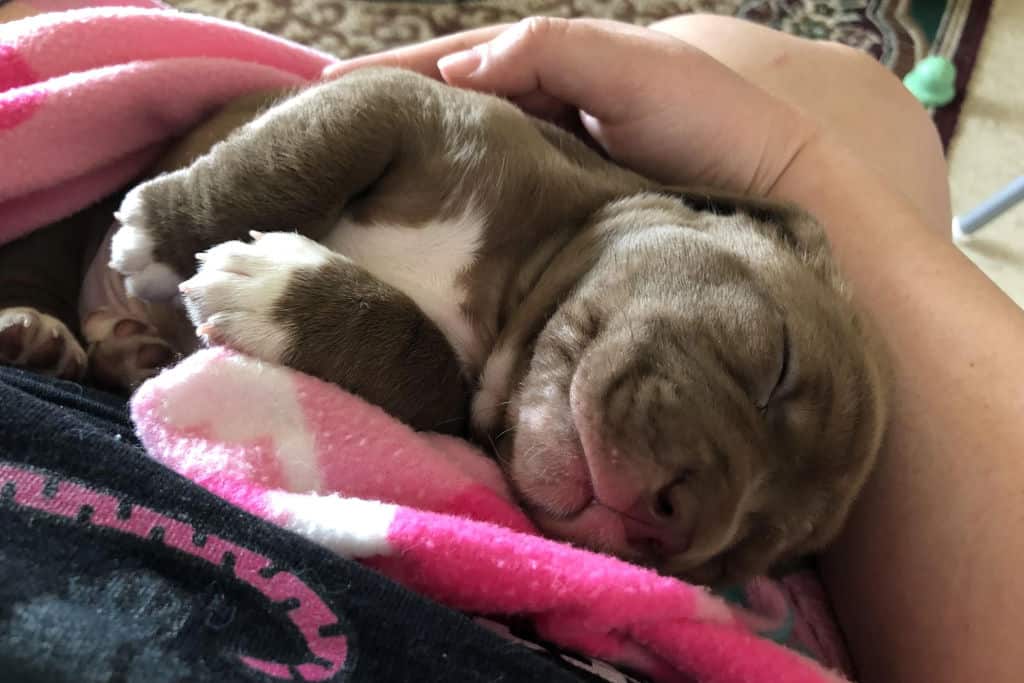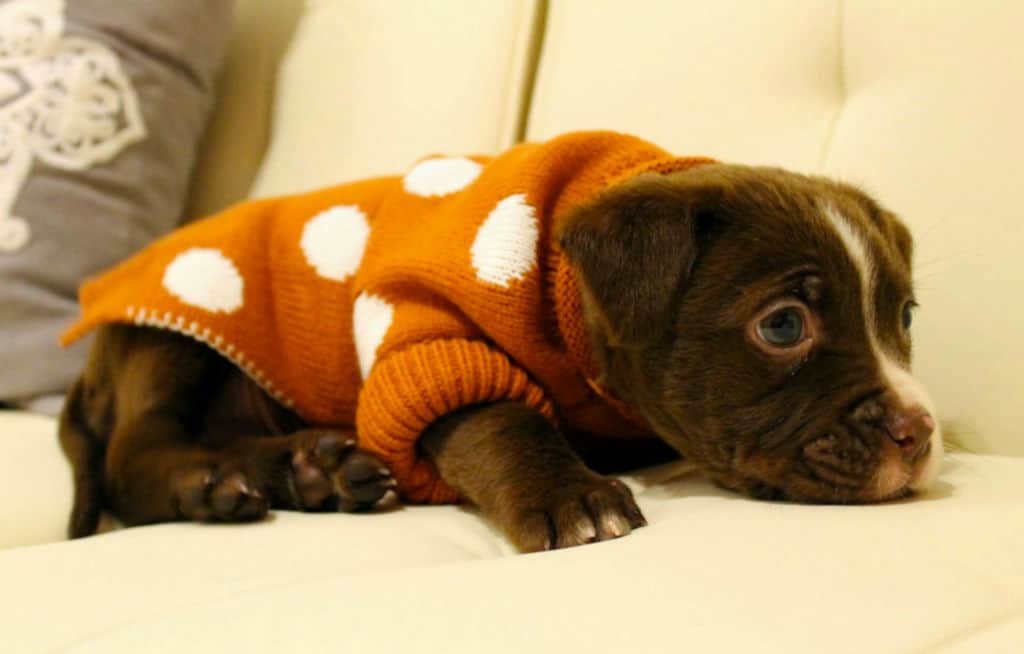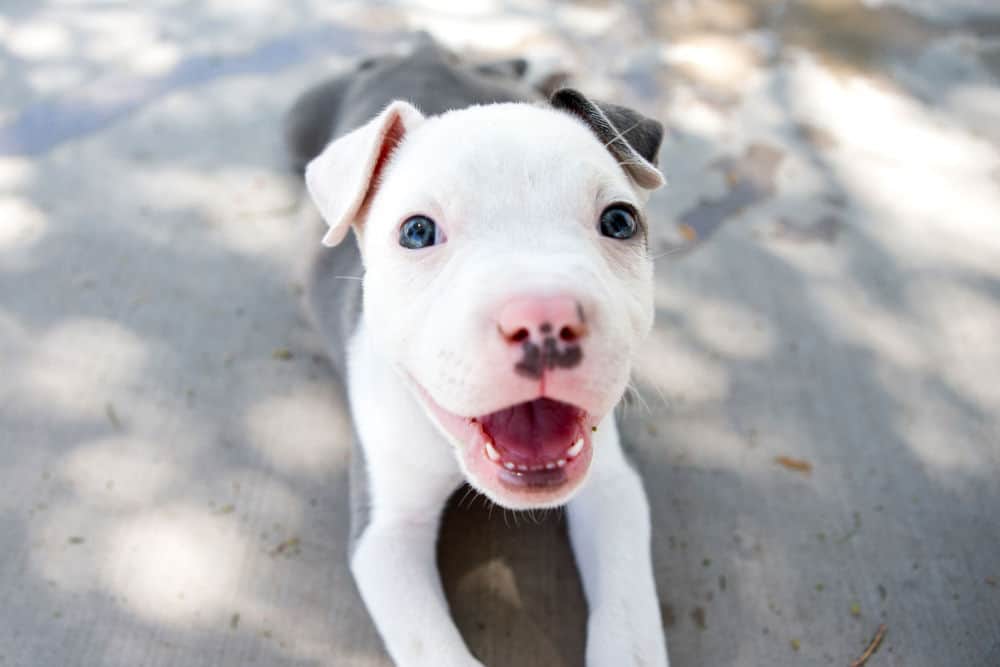Disclosure: We may earn a commission from helpful, relevant links in our content. No cost to you. See our privacy policy.
A month-old Pitbull puppy is too young to be separated from the mom and littermates. However, it does happen sometimes, and learning how to care for them is crucial in helping them become healthy and well-adjusted companions.
If a puppy can’t stay with its mother and littermates until at least 8 weeks old, it’s essential to learn how to properly take care of such a young Pittie. And we’ve got you covered.

What Should You Feed a 3-4 Week-Old Pitbull Puppy?
Puppies are very small at 3 to 4 weeks and rely on their mother’s milk for nutrition and immunity. However, if they’re somehow separated, the puppy should be fed with a special milk mix.
A puppy milk replacer supplies the required nourishment and antibodies to promote the puppy’s growth and development in these instances. They also contain minerals and vitamins that a puppy needs.
You can obtain puppy milk replacement formula and a bottle from PetSmart and Petco. You can also create your own (check below).
Aside from the milk replacer, puppies can eat wet dog food at 3-4 weeks. You can begin making gruel for them by slowly replacing the milk with canned wet puppy food, such as this Pedigree Chopped Puppy food. This Pedigree product is very popular with puppies, even those who are picky eaters.
Once the puppies acquire teeth, around four weeks, try softening the puppy food with water and mixing it with the powdered goat’s milk. It results in a nutritious mush. Ensure it’s at room temperature and the open can is chilled. Make sure to thoroughly mix the softened kibble with the milk replacer to avoid any hard chunks that could be a choking hazard for the young puppy.
You can start with a bowl of water at this point. As their teeth grow, you can begin feeding them puppy kibble that has been soaked in water or milk replacer to make it softer.
How Much to Feed Such a Young Puppy?
Puppies of 3 to 4 weeks old should be fed every 3 to 4 hours. Use the volume listed in the following table per the puppy’s weight to know how much to feed your Pittie pup:
| Puppy Weight (lbs, oz) | Puppy Weight (grams) | Daily Caloric Requirement* | Amount of Formula Per Day (ml)** | Amount Per Feeding (ml)* | Number of Feedings Per Day*** |
|---|---|---|---|---|---|
| 14 oz | 397 g | 79 kcal | 88 ml | 16 ml | 6 |
| 1 lb | 454 g | 91 kcal | 101 ml | 18 ml | 6 |
| 2 lb | 907 g | 181 kcal | 202 ml | 36 ml | 6 |
| 3 lb | 1,361 g | 272 kcal | 302 ml | 54 ml | 6 |
| 4 lb | 1,814 g | 363 kcal | 403 ml | 73 ml | 6 |
| 5 lb | 2,268 g | 454 kcal | 504 ml | 91 ml | 6 |
| 6 lb | 2,722 g | 544 kcal | 605 ml | 109 ml | 6 |
| 7 lb | 3,175 g | 635 kcal | 706 ml | 127 ml | 6 |
| 8 lb | 3,629 g | 726 kcal | 806 ml | 145 ml | 6 |
**It also notes that a concentration of 0.9 kcal/ml in milk replacer can lead to more feedings and slower growth than nursing off a mother.
***Puppies can begin to eat solid food at 3-4 weeks, reducing the need for milk replacers and leading to less frequent feedings. But be careful not to exceed their stomach capacity, as it can cause health issues.
Source: Maddiesfund.org
You’ll need a scale to measure how much to feed. If you’re unable to find a suitable milk replacer, you can make a homemade puppy milk replacer by using the ingredients from this table:
- Emergency home formulated replacer:
- 1 cup (240 ml) cow’s milk
- 3 egg yolks
- 1 drop high-quality oral multivitamin solution, if available
- 1 tablespoon (15 ml) corn oil
- Small pinch of salt
Instructions: Blend uniformly and warm to 95-100°F. Refrigerate between uses. Discard any unused milk replacer 24 hours after mixing.
- Homemade milk replaced for puppies:
- 1/2 cup (120 ml) cow’s or goat’s milk
- 1/2 cup (120 ml) water
- 2 to 4 egg yolks
- 1 to 2 teaspoons vegetable oil
- 1,000 mg calcium carbonate, if available.
Instructions for this one are identical to the one above. Just blend and warm to 95-100°F. Refrigerate and discard any milk if unused after 24 hours.
Either of these is fine, depending on what ingredients you have available at home.
Source: Maddiesfund.org
Socialization, Behavior Concerns, and Dog Parks
Socialization affects his capacity to socialize with other dogs and cope with stress. Puppies typically learn these things from their mothers and littermates.
A month-old puppy should not be separated from its mother. Getting a puppy at least eight weeks old is best since they need to learn social skills, such as not biting other dogs or people. If it still happens, consider the following things.
We recommend enrolling in a puppy class. Some puppy programs allow you to join before the dog receives vaccines, so these may be a good option for a young puppy. A large part of the training process is spent teaching you how to interact with your dog, which is difficult to assess independently. These will teach you the fundamentals.
Ideally, he will require dog companionship, so borrowing a puppy for a few weeks would assist him in learning how to socialize with dogs. Keep him away from unvaccinated dogs, foxes, animal excrement, unclean water, and other potentially dangerous animals.
As the puppy grows, introduce your pup to as many new people as possible, particularly other dogs. Too many owners fail to socialize their pit bulls, resulting in poorly behaved and aggressive Pitties.
If he doesn’t have the necessary experiences with other dogs as a puppy, he will never learn to speak “dog.” If he can’t communicate well with other dogs, he will become involved in fights as he develops.

Ensure your dog is exposed to well-behaved canines in ways that they appreciate. Dog parks are fine for many dogs, but make other plans for proper socialization because many dog parks are breeding grounds for undesirable behavior.
Look for a rescue with a mother and pups of similar age. Puppies learn vital social skills from other puppies, such as biting inhibition. Playing with other puppies, biting them, and being bit teach a puppy not to bite too hard, an essential ability for an adult dog.
Additionally, introducing various textures, like different types of safe toys and soft bedding, can stimulate their senses, aiding in their overall development.
Finding other puppies to socialize with is more important than being with a mother. Mom can be replaced with grooming and vitamins. The development of social skills is critical for a puppy to grow into a well-adjusted adult.
Dog behaviorists have determined that learning different skills from siblings is more vital than spending time with their mother. That is why respectable rescues foster puppies in groups of at least two.
He is meant to have stayed with his mother and littermates until he was around 8-10 weeks old, so you must recreate that interaction.
Proper socialization is essential for preventing reactivity. You want to train your dog to be neutral and calm around other dogs and people. Begin loose leash training when they are young and easy to manage. Crate training is also essential, especially for energetic dogs like Pitbulls, who can become destructive when left alone.
Health Concerns, Vaccinations, and Parasites
The puppy must first undergo a physical examination. Vaccinations should begin at 6 weeks, so please schedule an appointment with your veterinarian.
Here are the core dog vaccinations typically administered to puppies, and here are the non-core ones. Follow these guides as they only cover the basics of dog vaccines and is a great way to get started taking care of your pup.
You should also consult with your veterinarian about suitable deworming protocols. Puppy deworming usually begins about 2 weeks of age. Please avoid purchasing (OTC) over-the-counter deworming drugs. Many are not labeled for usage at the age of your puppy and can be harmful. Get the dewormer from your veterinarian.
Be on the lookout for parasites in their poop. You should take their fecal sample because worms are common in puppies.
You shouldn’t bring pups to dog parks before immunization since parvo is the most dangerous disease spread by unvaccinated dogs and their poop. Be cautious about taking him anywhere until he receives all the vaccines at 4 months. Parvovirus, for example, is fatal to puppies.
A clean environment is your best defense; regular sanitation of your puppy’s living area with a bleach solution can help in minimizing the risk.
With that in mind, most flea prevention methods and the Parvo vaccine shouldn’t be started until six weeks. The only flea medication allowed for young puppies is CAPSTAR, which is only effective for 24 hours.
If he does have fleas, a warm bath with a bit of dawn soap may remove them. Avoid Dawn Ultra because it can be aggressive. Also, avoid using over-the-counter flea shampoos and if you give them extra baths without shampoo, dry and reheat them immediately.
Related: Choosing Dog Shampoo (guide)
Finally, ensure the puppy is warm and get them a heat source. Auto warmer blankets are fine if set at low, but use caution with them. Full flea control guide here.

Can You Train a Month-old Pitbull Puppy?
It is not advisable to begin formal training with a month-old Pitbull puppy since they are not developmentally ready. Puppies at this age are mainly concerned with bonding with their mother and littermates and gaining socialization skills.
Basic training can begin, such as socialization and exposure to new surroundings and people. On the other hand, formal obedience training should wait until the puppy is at least 6-8 weeks old and has developed more cognitive capacities.
For basic puppy training, treat a pit bull like any other large-breed, strong dog, but remember that they are terriers and stubborn.
The key is being gentle but firm. Pitbulls are typically headstrong, but their trust is easily hurt. They react extremely well to positive reward training and extremely poorly to physical punishment.
Keep in mind that your puppy is only 3 to 4 weeks old and is only learning to walk. They will fall and fail a lot. As your pit grows and becomes stronger, invest in a good harness. A harness distributes pressure more evenly across the puppy’s body compared to a collar, reducing the potential strain on their neck.
Furthermore, because pit bulls are notorious chewers, it is critical to supply them with strong chew toys, such as those black Kong toys. Possession can develop into aggression, so teaching the puppy to wait for food and toys and practicing taking them away is essential.
Whatever you do, don’t leave anything lying around that you don’t want to be chewed. Don’t say I didn’t warn you. Providing a designated ‘safe zone’, like a playpen, can minimize unsupervised access to non-chewable items, and it also ensures their safety when you’re away.
What Not to Do With a Pitbull Puppy?
Here are a few things you shouldn’t do with your Pitbull puppy:
- Do not use physical punishment or aggression when training a Pitbull puppy, as this can lead to fear and aggression in the dog. Positive reinforcement techniques are more effective and humane.
- Do not over-exercise a Pitbull puppy, as their joints and bones are still developing. Gradually increase the amount of exercise as the puppy grows.
- Do not feed a Pitbull puppy a diet high in protein or fat, as this can lead to health problems such as obesity and hip dysplasia.
- Do not socialize a Pitbull puppy too early, especially with unvaccinated/unfamiliar dogs, as their immune system is not fully developed until 6 to 8 weeks.
- At the same time, do not neglect to train or socialize a Pitbull puppy, as it can lead to behavioral issues like aggression and fearfulness.
- Do not leave a Pitbull puppy alone for long periods, as they are social animals and require human companionship.
- Do not stereotype or label Pitbull puppies as inherently aggressive or dangerous. They are loving and affectionate dogs with proper training and socialization.
FAQs
Can You Bathe a 3-To-4 Week Old Pitbull Puppy?
It is generally not recommended to bathe a three or 4-week-old puppy as they are still very young and their immune system is not fully developed yet. Additionally, bathing can dry out their skin and cause. Still, formal leads to health problems. It is best to avoid bathing a puppy until they are at least 6-8 weeks old and its immune system is stronger.
If a month-old puppy is dirty or has a bad odor, it’s best to spot-clean the puppy using a damp cloth or sponge and avoid getting its face or head wet.
When do Pitbull puppies start eating wet food?
Pitbull puppies can typically start eating wet food around 3-4 weeks of age. You can introduce wet food alongside their regular high-quality puppy formula or breastmilk diet. Gradually transition to a combination of wet and dry food as they grow to avoid stomach upset.
Can 3-4 week Pitbull puppies go all night without eating?
At 3-4 weeks, Pitbull puppies need to eat every 2-3 hours, including overnight. Going all night without eating may lead to weakness, dehydration, and hypoglycemia. Have a plan in place for overnight feedings or seek professional help.
For how long can you leave a Pitbull puppy alone?
It’s not recommended to leave a Pitbull puppy alone for long periods because they need regular potty breaks and human interaction. Puppies should not be left alone for more than 3-4 hours. Arrange for someone to check on them if you need to be away longer.
Alex, a passionate animal lover, has experience in training and understanding animal behavior. As a proud pet parent to two dogs and three cats, he founded AnimalReport.net to share insights from animal experts and expand his knowledge of the animal kingdom.




